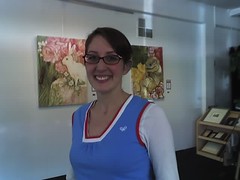I blame the Lambda Award reading last night and “Betty’s List” for this photo of me feeling good and just a little tipsy. I will now regale you with my shallow comments on fashion! And a few responses to the actual literature!
The reading was in the Hispanic Room at the SF Public Library. “Do you think there will be real food? Or just cheese and crackers?” I asked… “Oh, they said ‘catered’ so probably something like real food. Maybe. But you might be allergic to all of it.” The food was great; these endive apple cheese things, tomatoes and mozzerella with basil leaves, sandwichy wrap things, hellish lemon squares and brownies. All good and super fresh…
The room started to fill up. I bought a copy of Bullets and Butterflies: Queer Spoken Word Poetry. Between being tired, distracted by thoughts of my giant anthology project, and stuffing myself full of the mozzerella tomato things, I wasn’t feeling too chatty. But I did talk with Horehound, and with Nikos Diaman who is an artist and novelist and was super nice. And then I went up to talk to Charlie and complimented the chick she was talking to’s nifty fluttery-sleeved black gauzy trench coat thing, and she turned to me automatically in this certain way that was graciously accepting of my starry-eyed fangirl love, which was great except I had no idea who she was even when she said her name – it was Kate Braverman. I must fit the profile of her adoring fans… perhaps I’ll join the throng of KB minions out there! She seemed rather mad and charming. “Are you a writer?” “Er, mutter mutter, um, yup.” “You are? How come I haven’t heard of you then?” I’m sure she meant it kindly. I’ll hear her read this Saturday at Writers with Drinks!
Some library guy introduced things. Gayly. Then Charles Flowers did some more introducing and talked about the Lambda Awards & how they’re important to the country… to declare our diversity and say “here is the best of what we’re making, and it’s part of the mainstream of culture too.” I applauded this heartily!
Charlie Anders read from her fantastic novel “Choir Boy” – a few pages where Berry, a teenager who has started taking hormones so his voice won’t break, gets awarde the “mack hat” by his fellow choristers and then talks to his choir director about music and “signal vs. noise”. “If music is just about itself, then what makes it … goddy?” I’ve read Choir Boy twice. I highly recommend it! Charlie’s retro-stylish black dress fit her curves perfectly and I also loved her shiny-toed velvet and vinyl pumps. The dress was also cute with sneakers and a leather jacket, later.
Joshua Gamson read from “The Fabulous Sylvester.” Great writing, I could listen to his descriptions of Sylvester’s outfits and sparkling charisma all day long… I kept thinking of the feeling I get when I listen to “Mighty Real”… this sort of angelic utopian quality, ethereal and soaring… the sort of angel who would prance around in public in a dress made entirely of aluminum pie plates and silver angelhair christmastree tinsel. One sort of hoped… that the professorial dignity of Joshua Gamson himself might be influenced by his material… but no, he was something of a prepster. Maybe he was secretly wearing spangled underwear.
Let’s listen to “Mighty Real” right now! Wooooo!
Tirza True Latimer then read from her book about women in Paris in the 1920s and lesbian visual coding. Like, how to tell if someone were queer or not from the subtle details of their outfit. Latimer’s outfit had already been knocking my socks off, kind of an understated classy pimp butch thing, with a bronze satin wide-collared button down shirt and an oceanic swirly blue tie that made me think of all the modernista poetry and the ocean nymphs wearing only a blush and sea-mist. Well, Latimer went on to define exactly what we mean or don’t mean by “Lesbian” and to complicate that word in the finest of academic-ese so that I felt I knew what she meant even though I didn’t. I wondered if she had read Margaret Reynolds’ “The Sappho Companion” and what she thought of its construction of what Sappho meant to artists and writers in the 20s and also felt like having a good long conversation about the public reception of “The Songs of Bilitis”. Then I’d make out with her modernista necktie.
Katia Noyes read a bit out of Crashing America, a part “about guns and sex”. It was awesome… I can’t wait to read the book. I can’t even talk about Katia’s outfit because it was too cute. I wanted to steal her dress right off her.
Ursula Steck read from one of her mystery novels, a scene with two women in the woods, some creepy guys with baseball bats, and a dead maggoty raccoon. Eeep! Scary! She was dressed in black and had a cute nerdy butch dyke look with spiky black hair, thick-framed glasses, and black wheelchair. She totally had a matching girlfriend. “All in black” sounds goth but the effect was NOT goth but overwhelmingly library-nerd-hot.
Horehound read his poem “bottom who doesn’t”… “A butch motherfucker with a twelve-year-old girl at my inner core/ I’m a huge sissy and one of the original punk rockers…” I love Horehound because I’m totally the opposite. I’m a twelve year old girl with a butch motherfucker at my core. And whenever I dress up like a guy I copy Horehound’s punk sissy look. I hope he doesn’t mind.
Mattilda then pranced… sashayed… runwayed… up to the front of the room to deliver a rousing diatribe against the title of her own book, Best Gay Erotica. We are against bad, boring, ho-hum erotica that follows the genre constructed with tame meekness! And we are against boring limiting constructions of ultramasculine masculinity and we are definitely not into Gay! We were all ready to start roaring and rioting. I think some gay guys hung their heads in shame, then ran out of the room to put on plaid pants and tear up the streets. But that was just the intro. The story, DogBoy and the Beta Goth, was an edgy story about two teenage boys named alec and ben. Nadyalec and Ben read us the story with irrepressible bouncy cuteness. They were ineluctably masculine, just like James Tiptree, Jr. I loved the story… and their outfits. Nadyalec was in a black nerdy-sissy outfit with a pink striped tie from hot topic. It is no wonder people sometimes mistake us for each other (only when my hair is slicked back.) Ben was gothy. And Mattilda was resplendent. I want to write poetry to his amazing outfits of stripey plaid flowery rainbowed glory! I used to get sent upstairs by my mom to change for wearing just such ensembles! They do m
y heart good.
Amber Flora Thomas read poems from “Eye of Water”. I particularly remember one about the urge to carve names into wood and about love. They were sweet poems… I felt that I could not judge them without seeing them for myself… Amber’s outfit was cute, mostly black, notably cute necklace with a big semi-precious stone… I did not figure out what kind of stone but maybe it had super crystal lesbian powers or emotional significance!
Then Katherine Forrest, who was nominated in three categories, read from her intro to Lesbian Pulp Fiction, all about how seeing (and, choking with fear, buying) an Ann Bannon novel in Detroit in 1957 changed her life and in fact saved her life. I bought Lesbian Pulp Fiction, which looks GREAT. We had a nice talk afterwards about SF and the wonders of Suzette Haden Elgin’s books, newsletters, blog, emails, Laadan, philosophy; in short we are fellow inhabitors of the Suzette Haden Elgin Empire or Utopian Vision. I don’t remember Forrest’s outfit at ALL which probably means it reached a pinnacle of lesbian understatement. Probably you aren’t supposed to notice it. Anyway, today I read Forrest’s own pulp SF novel “Daughters of the Emerald Dusk” and … well I kind of laughed my head off. I am totally going to send it to Nick Mamatas, I know he will LOVE it. It’s sort of like the lesbotopian drug-orgy version of “Childhood’s End” by Arthur C. Clarke. And it’s pulpy to the MAX.
We went off to Lesbian Night at this bar and restaurant, Mecca, on Market Street which if I were a REAL lesbian hipster instead of a pretend one, I would have already been to. Instantly I ran into the organizer of the event, Betty of Betty’s List, and tried to take her picture. It came out too dark. If you go to Mecca on Thursday night, do not have a lemon drop. Have a mojito. The virgin mojitos are also good. Anyway, we hung out with Elizabeth Stark, who wrote Shy Girl, and Angie and Katia and Wendy, and had a great time! It was far too crowded but still fun… and the drinks were expensive but the fries were cheap, delicious, hot, and came in a sort of bottomless basket of salty greasy-yet-still-chi-chi goodness.


